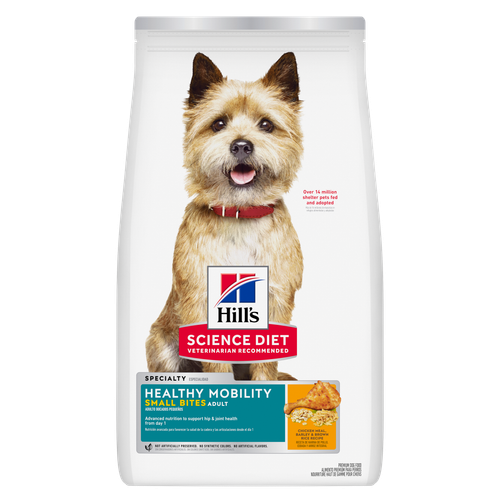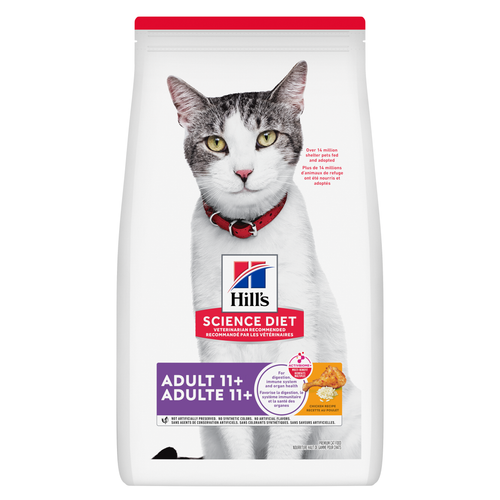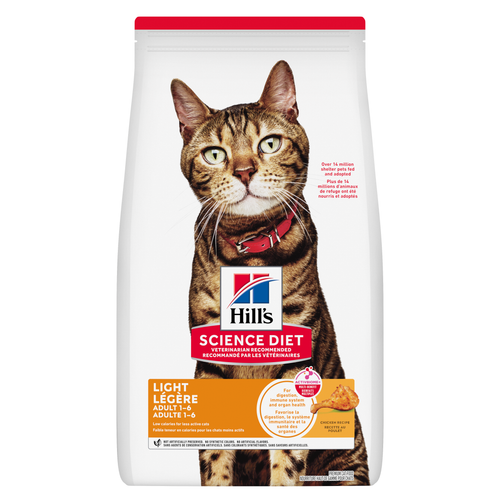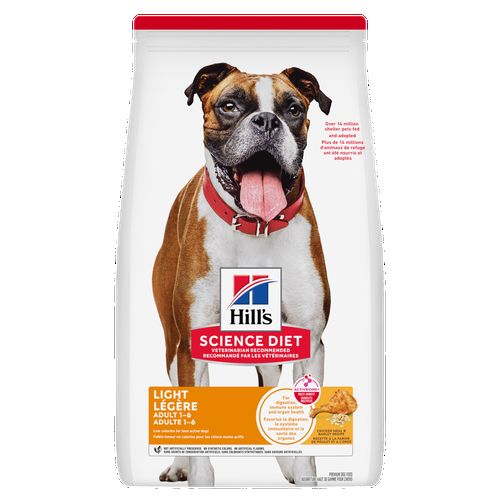
-
Find the right food for your petTake this quiz to see which food may be the best for your furry friend.Find the right food for your petTake this quiz to see which food may be the best for your furry friend.Featured products
 Adult Healthy Mobility Small Bites Chicken Meal, Barley & Brown Rice Recipe Dog Food
Adult Healthy Mobility Small Bites Chicken Meal, Barley & Brown Rice Recipe Dog FoodAdvanced nutrition to support hip & joint health from day 1
Shop Now Adult Light Large Breed Chicken Meal & Barley Recipe Dog Food
Adult Light Large Breed Chicken Meal & Barley Recipe Dog Food18% lower calories vs. Science Diet Large Breed Adult
Shop Now Adult Sensitive Stomach & Skin Small & Mini Chicken Recipe Dog Food
Adult Sensitive Stomach & Skin Small & Mini Chicken Recipe Dog FoodHill's Science Diet Sensitive Stomach & Skin Small & Mini dry dog food is tailored nutrition for Small & Mini dogs while being gentle on stomachs. Nourishes skin & promotes a lustrous coat.
Shop NowFeatured products Adult 11+ Chicken Recipe Cat Food
Adult 11+ Chicken Recipe Cat FoodSupports brain health & beautiful fur. Helps keep immune system, heart & kidneys healthy.
Shop Now Adult Healthy Cuisine Seared Tuna & Carrot Medley Cat Food
Adult Healthy Cuisine Seared Tuna & Carrot Medley Cat FoodDelicious seared tuna paired with tender carrots in a mouthwatering sauce
Shop Now Adult Light Chicken Recipe Cat Food
Adult Light Chicken Recipe Cat Food20% lower calories vs. Hill's Science Diet Adult
Shop Now -
Dog
- Dog Tips & Articles
-
Health Category
- Weight
- Food & Environmental Sensitivities
- Urinary
- Digestive
- Joint
- Kidney
- Dental
- Cancer
-
Life Stage
- Puppy Nutrition
- Adult Nutrition
- Senior Nutrition
Cat- Cat Tips & Articles
-
Health Category
- Weight
- Skin & Food Sensitivities
- Urinary
- Digestive
- Kidney
- Dental
- Stress
- Cancer
-
Life Stage
- Kitten Nutrition
- Adult Nutrition
Featured articles Importance of DHA in your Pet's Food
Importance of DHA in your Pet's FoodLearn about DHA, Docosahexaenoic Acid, a natural omega-3 fatty acid that is essential in the development of the brain and nervous system in cats & dogs.
Read More Water
WaterDiscover why water is the most important nutrient for your dog or cat to live a healthy life. Find out how much water your pet should consume each day.
Read More Antioxidants
AntioxidantsUnderstand the importance of antioxidants in your dog or cat's food, and how they can help protect your pet and keep them healthy.
Read More -


You know the scenario: your puppy is walking confidently next to you, head held high. You're so proud of how far he's come in his training in just a few short weeks. Your head is held high, too. After all, you have the perfect pooch.
Of course, that's when the leash goes taut, jerking you off balance. As you stumble back, you realize your perfect puppy has found some piece of unidentifiable food on the ground (at least you hope that's food!) that he's trying to lick up as fast as he can.
You wonder why he has to try and eat everything, but not before he's wolfed down a few bites of the sludgy mess.
So how can you prevent your dog from eating (usually gross) stuff off the ground on your walks? Read on for some ideas.
Why Does My Dog Try to Eat Everything?
Journey Dog Training owner Kayla Fratt says it's natural for dogs to want to taste or eat whatever they find — no matter how gross it might be. Dogs munch on poop and soggy garbage because it's in their DNA.
"Your puppy is acting on her most basic impulses to explore the world with her mouth, then eat everything she finds," she writes on her blog. "This isn't uncommon."
Fratt also notes that many puppies simply grow out of the stage where they want to try everything. But because eating weird things can be dangerous to your dog, causing an upset stomach or even requiring a trip to the veterinarian (and don't even mention that breath!), it's worth the effort to train your dog to steer away from things that shouldn't be in his mouth.

Teaching Your Pup to Focus on You
The first important step toward helping your pup stop eating everything in sight is to get him to master the command to "drop it" or "leave it." Sandy Otto, the owner of Puppy Preschool dog training, advises clients to practice this skill every day with a new puppy.
This training technique is easy to practice at home:
- Hold an object (like a toy) in one hand.
- Hold a treat behind your back with the other hand (you want to make sure the dog doesn't smell it).
- Let the dog chew on the toy you're holding, but don't release it.
- Put the treat up to his nose so he can smell it.
- When he lets go of his toy to get to the treat, give your command of choice and then give him the treat.
Practicing this consistently will teach your dog to let go of an object when you give your command.
Another way to help your puppy "drop it" is to distract him. Carrying treats on walks is important so that you can get your dog to pay attention to you immediately when you ask.


Tasty Tips
Dogged Decision Making
Just like young children, dogs can also practice impulse control. Fratt gives several ideas for "games" that actually teach a dog to "consult" with you before following his nose to that curious smell on the ground. She calls one game "It's Your Choice."
This game teaches your dog to pause and look to you for guidance when he wants something. It can teach him to make good decisions when he's being tempted:
- Put treats in your hand and hold your hand in a fist.
- Let your dog sniff, nibble or paw at your hand.
- Don't open your fist until your dog sits back to wait.
- Close your hand when he dives toward the treats. When he sits back again and waits a second or two, place one treat on the ground for him to gobble up.
- Gradually increase the time between opening your hand and delivering the treat to build his impulse control.
Staying Patient
While these methods can help reduce your dog's penchant to pick things up on walks, don't be surprised if these tips don't work all the time, Fratt says. Be patient, and don't be afraid to pause a difficult training session and try again tomorrow.
If you believe your dog's eating habits might be due to more than just curiosity, you should consult your vet. While unusual, your dog's tendency to eat everything in sight might come from a disorder called pica, which Wag! explains causes dogs to compulsively eat non-food items. A vet can help you determine if your dog suffers from pica. The American Society for the Prevention of Cruelty to Animals (ASPCA) also recommends keeping an eye out for other reasons that a puppy might chew on strange items, such as teething or stress.
By patiently working with your dog, playing teaching games and keeping your puppy focused on you (instead of on that fast food wrapper), you can help teach him that "going on a walk" doesn't mean "the buffet is open for business."


One of our staff authors prepared this article for you
Related products

18% lower calories vs. Science Diet Large Breed Adult

Hill's Science Diet Sensitive Stomach & Skin Small & Mini dry dog food is tailored nutrition for Small & Mini dogs while being gentle on stomachs. Nourishes skin & promotes a lustrous coat.

Advanced nutrition to support hip & joint health from day 1

18% lower calories vs. Science Diet Adult
Related articles

Your dog's coat and skin are a big part of your dog's overall health. Ensure you keep your dog's coat healthy, by following these simple tips.

Discover how the field of dog science is giving us more and more insights into the inner workings of our furry best friends.

Learn basic steps & precautions for treating a cut on your dog, including what you can put on the cut, and when you should take them to the vet.

Learn how dogs with sensitive skin can have special dietary needs, how they can develop over time in a healthy dog, and how Hill's dog food can help.

Put your dog on a diet without them knowing
Our low calorie formula helps you control your dog's weight. It's packed with high-quality protein for building lean muscles, and made with purposeful ingredients for a flavorful, nutritious meal. Clinically proven antioxidants, Vitamin C+E, help promote a healthy immune system.
Put your dog on a diet without them knowing
Our low calorie formula helps you control your dog's weight. It's packed with high-quality protein for building lean muscles, and made with purposeful ingredients for a flavorful, nutritious meal. Clinically proven antioxidants, Vitamin C+E, help promote a healthy immune system.

